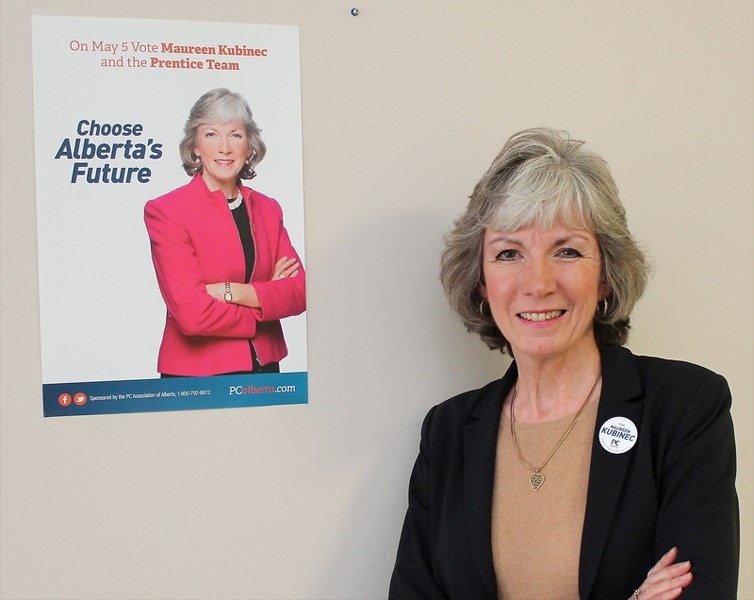The Alberta government is forging the way for more women to enter politics with the #ReadyforHer campaign, an initiative encouraging more women to run for local office.
The campaign launched Oct. 18 with a focus on municipal government, as well as school boards, First Nation band councils, and Métis settlement councils, in time for the 2017 election. The online resource offers information on understanding the role, nomination requirements, how to run a campaign and when to do so.
“Alberta cities and towns need councillors that reflect their communities,” said Stephanie McLean, minister of Status of Women. “Half of Alberta’s population is women, but men hold most of the positions. I want every woman to know Alberta is ready for her to run.”
According to a study from Alberta Municipal Affairs, 490 women were elected in 1,874 Alberta municipalities in the 2013 election; that is, only 26 per cent of elected officials were women.
Locally, both Westlock County and the Town of Westlock councils are completely governed by men with seven on each council. One woman, Christa Clausing, sits on the Village of Clyde’s five-member council and all three local Pembina Hills Public School trustees are women.
The #ReadyforHer campaign notes that some of the biggest barriers to women running for politics surround child and family care, education, political culture and sexism, campaign resources, political parties and incumbency.
Time commitment and childcare were two issues that Maureen Kubinec dealt with. Kubinec entered politics because she was interested in her children’s education and having a parental say.
As a former MLA of Barrhead-Morinville-Westlock and culture and tourism minister, Westlock County councillor and an 18-year career on various school boards, including Pembina Hills Public Schools and president of the Alberta School Board Association, she said her career would not have been possible without family support.
“That is definitely one of the biggest obstacles to overcome, in my opinion, with being involved in those types of boards and elected positions is the time factor,” she said. “Actually, I ran when I was 31 years old and several months later got pregnant and had my last child when I was on that board.
“I packed that baby for six months with me, and I had the superintendent carrying diaper bag and the secretary-treasurer carrying the car seat.
“We just carried on, and this was almost 30 years ago. People were pretty progressive, I would say. That child is now 29.”
She recommended that women with young children find a support system that will enable them to pursue this careerpath.
“I had a sister who lived very close by and she took my baby when I couldn’t take him with me,” she said. “Having a support system — a spouse, other family —that can help makes a big, big difference, just so you then aren’t at that meeting riddled with guilt. If you’re feeling comfortable where your child’s at, then that makes all the difference in the world.”
Shirley Morie, Town of Westlock mayor for nine years, entered political life after retiring from her job.
“I was interested in politics all my life and still am,” she said. “It wasn’t a big decision for me to make because all my time, which was about 30 years running the auxiliary hospital and nursing home, it’s a political position. You have to be aware of the politics of the area and deal with things in the proper manner, no matter what it is.”
She did note that the job came with a significant time commitment for committees, council meetings and learning opportunities.
“I was widowed halfway though my second term — my husband was very supportive of me — but after I became widowed, then I absolutely did what I wanted,” she said.
“Be prepared to commit yourself to the job and only do it if you’re really interested in furthering the community, and be prepared to commit your time and hard work. I think it’s a very fulfilling thing to do.”
Both women spoke of positive experiences in government and recalled little of sexist encounters.
“I don’t think it made any difference to the male councillors whether there were females on or not, and vice versa,” Morie said. “I looked forward to going to work everyday, I looked forward to helping solve the problems that came up and initiating new ideas and exploring other people’s ideas. It’s a very dynamic lifestyle.”
Kubinec said she also had a positive experience.
“I always found that I was treated with respect,” she said. “If there was someone in the meeting who wasn’t, it generally was the other men in the room that set them right. I can’t really remember a bad experience because of my gender. It was overall a good experience for me.”
However, she added that it was important to have a women’s voice represented, often when there are none, as was the case for her many times on council.
“Somehow you tend to bring a different perspective to a situation, whether it is a land-use bylaw or programs that are asking for support from the county or the town,” she said. “You may have some personal experience to bring to the table that they will listen to. I find that generally, we’re all human beings, and if people present a valid argument in a common rational manner, people listen. Part of it is the art of diplomacy — you don’t beat people over the head with your ideas. You use diplomacy to get your point across.”



